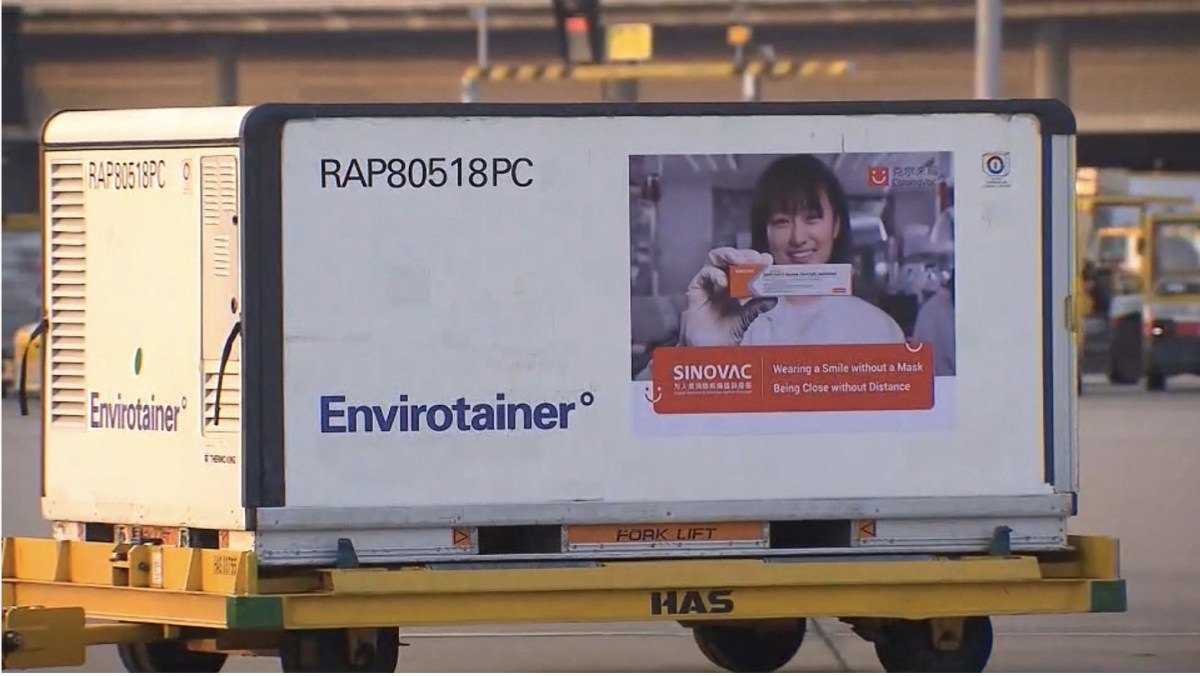[ad_1]
With the prospect of Covid jabs no longer being hard to come by, Hong Kong and Beijing are taking different approaches as public sentiments diverge.
A million doses from Chinese drugmaker Sinovac are now in Hong Kong after the city quickly cleared all the assessment and approval procedures.Â
The expert panel that green-lighted the drug said its recommendation was based on data from Sinovac, admitting that related statistics had not been peer-reviewed in scientific publications.
Still, they sought to assure a skeptical public that no corners had been cut and that benefits would outweigh risks, despite the drug’s efficacy rate being marginally above the World Health Organization-recommended threshold of 50%.
Hong Kong’s immunization program will open for online bookings from February 23, and priority groups can receive jabs at community centers and government clinics three days later.
Notwithstanding the public’s lukewarm desire to be inoculated, the city has guarantees of 22.5 million doses from Sinovac and other suppliers, with the goal being to vaccinate the entire population of 7.5 million by the third or fourth quarter.Â
The city of Beijing is also counting down to a wider roll-out of shots next week, after an injection blitz for health and other essential workers. The Beijing Daily said an end of May deadline had been set to administer shots to a majority of residents in the capital’s 16 districts and suburban counties, and that five million slots had been booked already.Â
The paper said vaccination would be free and voluntary, and that grid-by-grid community publicity campaigns and surveys to gauge people’s take-up would ensure steady headway towards of immunizing 10 million people before the harsh winter to prevent any bounce in cases. Beijing has 22 million dwellers. Â
Sinovac, which is based in the city and runs a sprawling manufacturing plant near Daxing airport, will ship the bulk of shots.Â
The 10 million-goal indicates the high level of confidence among Beijing officials and the pliant public, though complaints have been made about the obscure way jabs are given, usually with little information about suppliers and the provenance of ingredients. People can not choose products from other manufacturers such the state-owned SinoPharm.Â
Even so, a consent form detailing possible side effects as well as time of injection must be signed and on-site medical observation is compulsory.
More trust has been earned after Beijing party chief Cai Qi, also a member of the Communist Party Politburo, took the lead to get Sinovac jabs during a televised event.
The city’s government is revving up preparations for this year’s Chinese parliamentary session in early March as well as the Winter Olympics in February 2022. These events are unlikely to take place without top-down vaccination drives. Â
Ill feelings are also spreading among many Beijingers not yet notified for inoculation or those who fail to pounce on slots amid the scramble, as they take swipes at what is seen as unfair allocation that prioritizes government employees and their families.Â
Residents in lower-tier cities and counties across China are also fuming over the stalled roll-out in their regions after the National Health Commission pledged free shots for all at the end of last year but put the onus of working out the details on regional governments.
Almost all provinces have been slow to announce arrangements, indicating tight supplies. Some suspect big cities like Beijing, Shanghai and Guangzhou can get hold of shots ahead of others and these megacities may want to stockpile drugs.Â
The opposite situation is in Hong Kong, where talk of mass vaccination and herd immunity is met with incredulity.Â
The city is steeped in distrust of the government, talk of vaccine risks and even conspiracy theories. A growing cluster of anti-vaxxers is shunning calls from officials to roll up their sleeves for shots, let alone for Chinese products that many believe are likely to be defective.Â
An international survey by UK-based pollster YouGov found that less than 40% of the roughly 5,000 Hongkongers asked said they would get jabs when available. The percentage is third-lowest among the 24 jurisdictions included in the project held in January. Mainland China’s vaccine take-up rate, at 65%, is among the top ten.Â
The Hong Kong government’s approval of Sinovac shots has failed to lay doubts to rest. Pundits say the Chinese vaccine does not hold out much hope for the city to open up again.Â
Prof. Benjamin Cowling, head of Epidemiology and Biostatistics of the University of Hong Kong’s School of Public Health, said Sinovac shots may not help form meaningful herd immunity as its effectiveness rate – 62.3% if two jabs are given 21 days apart – still fell short of the internationally recognized threshold of 66.6%. Â
“The evidence [about effectiveness] remains flimsy at best. Even if the entire population in Hong Kong gets the Sinovac drug, we still need to wear masks and all quarantine measures will have to stay, and we can’t start going about our lives as normal,†Cowling said, adding that the city may need to administer booster shots to those already given the Sinovac vaccine when better formulas can be developed in 2022 or 2023.Â
That said, Hong Kong’s Health Minister Sophia Chan has assured people of more than one vaccine option. She said the first one million mRNA shots manufactured by BioNTech in Germany, with a much higher efficacy rate of 95%, would arrive by the end of the month.Â
“The two types of shots will be administered to people at different community centers and clinics so people can make their choice, provided that supplies can be further ratcheted up,†she said.Â
Read more:
[ad_2]
Source link













